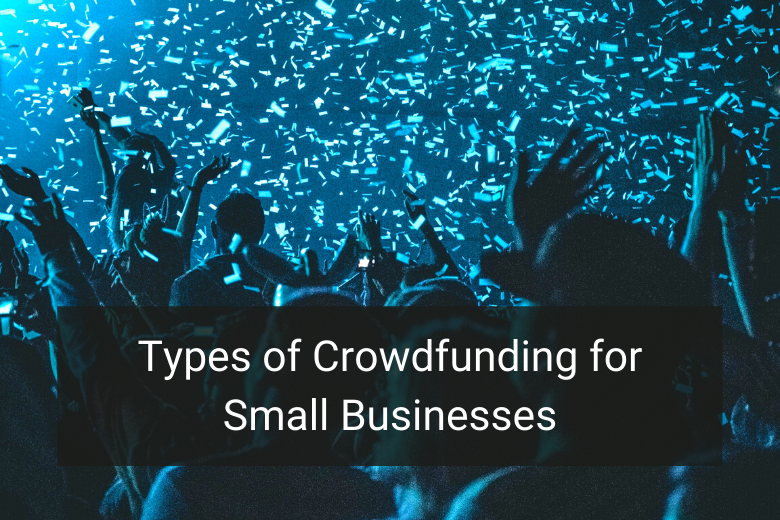Today, crowdfunding has become a viable process to raise money for businesses.
Entrepreneurs and startups have the option of crowdfunding if they want to finance their businesses. Crowdfunding can substitute the traditional forms of fundraising, such as angel investing, venture capital, and bank loans.
There are different types of crowdfunding available, and you should be aware of all types to pick the best that fits your business.
Primarily, there are three types of crowdfunding, such as reward, donation, equity-based crowdfunding.
-
Reward-Based (Kickstarter, Patreon)
-
Equity-Based (CircleUp, SeedInvest)
-
Donation-Based (Indiegogo)
Reward-Based Crowdfunding
Reward-based crowdfunding models have become popular these days.
The reward crowdfunding involves the individuals contributing money and receiving products or services of the company in the form of rewards. Since these models do not provide any equity or financial returns, it is called reward-based crowdfunding.
Fundable, Kickstarter and Patreon are some of the crowdfunding platforms that have this option of crowdfunding. It is now becoming an attractive way of fundraising for numerous small businesses and innovative projects.
This is because it is more efficient and effective to prepare, launch, and manage in comparison to the traditional ways of fundraising.
Here are some of the pros and cons of the reward-based crowdfunding:
Pros:
1. Raising money with low risk
Through this method, a small business can raise low-risk funds for their business. This is because they are not selling their part of their business or generating any loan. They do not have to deal with the burden of payment of loan or creditors.
2. Full control over business
Owners are not providing equity or borrowing funds. So, the entrepreneurs are sole owners having full control over their business. The individuals that are contributing will get the products and services of the company in the form of rewards.
3. Small businesses get market exposure
Nowadays, several businesses are selecting reward-based crowdfunding for the business. The reason is that small businesses will attract much more than financial support. They will attract connections with media, loyal customers, fans and others.
Through these, they can easily market and promote their products and services in the market and work on expanding their business.
Cons:
1. Projects fit reward-based crowdfunding
Reward-based crowdfunding doesn’t work for all types of projects, only specific types of projects get the attraction of the contributions.
Companies and projects that can provide interesting and valuable products/rewards to contributors will get better results. For example, a company that launched a smart bulb product was able to offer the bulb to investors for $5, which generated lots of interest. Investors could get the product in return of putting $5.
2. The pressure begins
You can start to celebrate after raising funds through reward crowdfunding.
The pressure begins after you receive funds because now they have to start shipping the products to the contributors. It will surprise you that the premier projects of reward-based crowdfunding are slow in sending out rewards to their contributors.

Equity-Based Crowdfunding
The equity-based crowdfunding is extremely different from a donation and reward-based crowdfunding.
In equity-based crowdfunding, the contributors are allowed to become part owners in the company. The founder sells off a part of their business in exchange for the funds. It is a more conventional method of fundraising from the larger pool of investors.
Equity-based crowdfunding is best suited for founders who are seeking to raise a large number of funds. CircleUp and SeedInvest are some of the crowdfunding platforms that have this option of crowdfunding.
As like other crowdfunding methods, equity-based crowdfunding has few pros and cons:
Pros:
1. Easy access large capital for business
It is the biggest advantage of equity-based crowdfunding that it is preferred over other crowdfunding methods.
The online crowdfunding platforms allow entrepreneurs to showcase their projects to a larger pool of investors. Through these, there is more chance of raising a large amount for the businesses.
2. The low burden on management
The equity-based crowdfunding does not provide the full burden on the company’s management as it happens with the traditional methods, such as venture capital, bank loans, and others.
Although the diversion of companies shares has increased, there will be involvement of a large number of investors. Now, power in the company is not concentrated around a particular group of shareholders.
Cons:
1. Low return with high risk
There are limited existing options available in case of equity-based crowdfunding because the securities purchased by the investor are less liquid. The startups are extremely risky ventures and there are more chances of failure. Therefore, the risk associated with such investments is more as compared to the other methods.
2. Entrepreneurs have to give up some of their ownership
Since equity crowdfunding is related to the issuance of equity to the contributors, the entrepreneurs have to give some ownership in the company. The rights in the company will be diluted among the large pool of investors.
Donation-Based Crowdfunding
Donation-based crowdfunding is an online way to generate funds through donation campaigns.
In exchange for donation, the contributors receive the token rewards that increase the prestige as the size of the donation increases.
Fundraising for disaster relief, charities, nonprofits, and medical bills are some of the common initiatives of donation-based crowdfunding.
Donation-based crowdfunding is completely different from reward or equity crowdfunding because there is no promise to repay or ownership stake in the company.
There are few benefits and cons of donation-based crowdfunding:
Pros:
Through donation-based crowdfunding, the startups can pre-sell their products and services to a large number of people who have donated small funds for their projects.
To encourage higher donation from the investors, the startups have to offer token rewards of increasing value. This will increase their interest in your startup.
Cons:
The startups want to raise a large amount of money for their business, so this method is not preferable for them. The investors will show less interest in their projects as they are not getting rewards against their contribution.

Conclusion
Any entrepreneur having an innovative business idea and want to raise funds for their business can adopt any of these crowdfunding methods according to their business type and size.
They need to remember that crowdfunding methods are not a fast-track way of fundraising. Creating a successful crowdfunding campaign is a part of a marketing project as like the other projects undertaken by the company.
The entrepreneurs need to implement strategies, planning, and efforts to make it a success whether it is a reward, equity or donation-based crowdfunding.
Author
Piyush Jain is the founder and CEO of Simpalm, a mobile app development company in the USA.
Piyush founded Simpalm in 2009 and has grown it to be a leading mobile and web development company in the DMV area. With a Ph.D. from Johns Hopkins and a strong background in technology and entrepreneurship, he understands how to solve problems using technology.
Under his leadership, Simpalm has delivered 300+ mobile apps and web solutions to clients in startups, enterprises and the federal sector.

Ready To Upgrade Your Logistic Solution?
Speak to Floship ecommerce logistic consultant about improving your global support chain today





